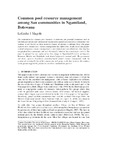| dc.contributor.author | Magole, I. | |
| dc.date.accessioned | 2011-05-19T09:38:22Z | |
| dc.date.available | 2011-05-19T09:38:22Z | |
| dc.date.issued | 2009-12-14 | |
| dc.identifier.citation | Magole, L. (2009) Common pool resource management among San communities in Ngamiland, Development Southern Africa, Vol. 26, No. 4, pp. 597-610 | en_US |
| dc.identifier.other | 10.1080/03768350903181381 | |
| dc.identifier.uri | http://hdl.handle.net/10311/793 | |
| dc.description.abstract | The contestation for common pool resources in Botswana pits powerful institutions such as
national governments and international organisations against powerless local communities who continue to rely heavily on these resources despite all attempts to dislodge them. This paper explores how common pool resource management has shifted from locally based and peoplecentred
endogenous resource management to state-defined and controlled forms. This shift has
marginalised San communities, who have historically relied on their commons for survival. The
paper is informed by case studies of two San villages in Ngamiland District in northwestern
Botswana, Mababe and Phuduhudu, both situated adjacent to national parks. The government
and donor agencies introduced community-based natural resource management with the
promise of reversing the loss of the commons for such groups as the San; however, the evidence on the ground suggests the promise has not been translated into practice. | en_US |
| dc.language.iso | en | en_US |
| dc.publisher | Routledge | en_US |
| dc.subject | Community based natural resources management | en_US |
| dc.subject | San | en_US |
| dc.subject | Common pool resources | en_US |
| dc.subject | Marginalisation | en_US |
| dc.subject.lcsh | Marginalisation | en_US |
| dc.title | Common pool resource management among San communities in Ngamiland, Botswana | en_US |
| dc.type | Published Article | en_US |
| dc.link | http://dx.doi.org/10.1080/03768350903181381 | en_US |

